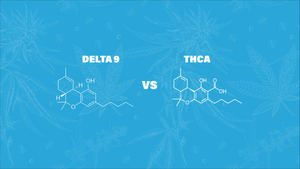Exploring the Differences Between THCA vs Delta 9
Aug 28, 2023
Cannabis, with its wide array of compounds, has captivated the interest of both researchers and enthusiasts. Among its numerous compounds, two stand out: THCA (tetrahydrocannabinolic acid) and delta 9 THC. In this article, we delve into the world of THCA and delta 9 THC, comparing their properties, effects, and significance.
What is THCA?
THCA serves as the non-psychoactive precursor to Delta-9-THC within the cannabis plant. It's abundant in raw or freshly harvested cannabis. Unlike its psychoactive counterpart, THCA doesn't directly interact with the brain's endocannabinoid receptors, and therefore doesn't induce the typical "high" associated with cannabis consumption.
The Mechanism of THCA
Upon exposure to heat or ultraviolet light in a process known as decarboxylation, THCA loses a carboxyl group and transforms into Delta-9-THC. This conversion is what triggers the psychoactive effects commonly linked with cannabis usage. For a visual representation of this process, check out this informative video: .
A Closer Look at Delta-9-THC
Delta 9 THC stands as the principal psychoactive compound in cannabis, responsible for the sought-after "high" or euphoric effects. It binds to CB1 receptors in the brain and central nervous system, leading to shifts in neurotransmitter release and the characteristic alterations in mood, perception, and cognition.
It's important to note that the potency of Delta-9-THC in inducing these effects can vary significantly based on factors such as strain, consumption method, and individual tolerance. While known for its recreational use, Delta-9-THC also demonstrates potential therapeutic applications; consult your doctor for further information.
A Comparison: THCA vs Delta 9 THC
1. Psychoactivity: Delta 9 THC is notably psychoactive, eliciting the "high" associated with cannabis consumption. In contrast, THCA, in its raw form, lacks this psychoactive property.
2. Activation: THCA necessitates decarboxylation, achieved through heat exposure, to convert into psychoactive delta 9 THC. This transformation naturally occurs during processes such as drying, curing, or vaporization. Check out the best selling THCA Disposables.
3. Health Potential: While both compounds exhibit potential health benefits, the non-psychoactive nature of THCA makes it an appealing option for therapeutic use without intoxication.
In the realm of cannabis, THCA Vapes and delta 9 THC play distinct roles, each offering unique properties and potential advantages. THCA, found in its raw plant form, holds promise as a non-psychoactive therapeutic agent. On the other hand, the psychoactivity of delta 9 THC solidifies its position as a cornerstone of both medical and recreational cannabis usage. Ongoing research promises a deeper understanding of these compounds and their interactions, potentially opening new pathways for harnessing cannabis's extensive potential for health and wellness.
Summary: This blog article explores the differences between THCA vs Delta 9 THC in cannabis. THCA, the non-psychoactive precursor, undergoes transformation into psychoactive delta 9 THC through decarboxylation. The article highlights their distinct properties, effects, and potential benefits, catering to both medical and recreational cannabis users. Ongoing research could lead to greater insights into their applications in health and wellness.
Understand the differences between THCA and Delta-9 with our insightful guide at Little High. Our "THCA vs Delta-9" article provides key information to guide your choices in cannabinoids. Explore the details and consider enhancing your knowledge with our THCA Flower for a holistic understanding. Trust Little High for accurate information and quality products, including our THCA Flower.

